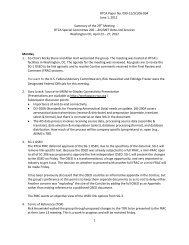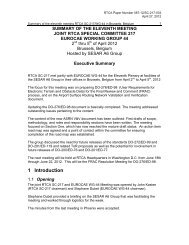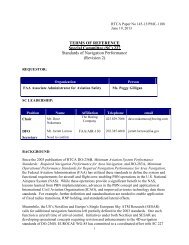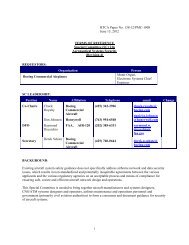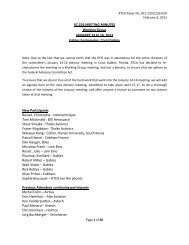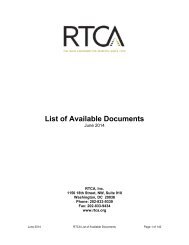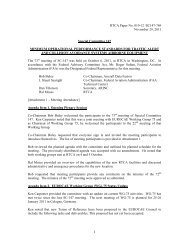2009 Annual Report - RTCA
2009 Annual Report - RTCA
2009 Annual Report - RTCA
You also want an ePaper? Increase the reach of your titles
YUMPU automatically turns print PDFs into web optimized ePapers that Google loves.
Program Management Committee and<br />
Special Committees<br />
Program Management Committee (PMC)<br />
The Program Management Committee (PMC), itself a Federal advisory committee, manages<br />
most of the Federal advisory committee-related business of <strong>RTCA</strong>. The PMC currently comprises<br />
19 members representing a broad cross-section of the aviation community and is structured<br />
to offer a balance between technical and operational considerations. The PMC establishes Special<br />
Committees (SCs) in response to an identified need by government and industry. The PMC approves<br />
the Terms of Reference (TOR) for the Special Committees; approves the chairs; approves<br />
committee recommendations; reviews reports; and approves, modifies, returns for additional<br />
work, or disapproves these reports.<br />
Managing the SCs is a growing challenge for the PMC as aviation communications, navigation, surveillance,<br />
and air traffic management (CNS/ATM) systems are becoming increasingly complex and interdependent.<br />
In <strong>2009</strong>, the PMC established an Integration and Coordination Committee (ICC) to ensure<br />
continued integration and coordination of Special Committee activities by instituting a review of all<br />
Special Committee TORs and monitoring the accomplishment of those TORs to ensure that integration<br />
and coordination issues are identified and resolved.<br />
Special Committees<br />
<strong>RTCA</strong> Special Committees (SCs) serve as Federal advisory committees and are generally formed in<br />
response to a request from the FAA or, less frequently, from the industry, to address more technical<br />
topics. Special Committees develop recommended minimum performance standards, including Minimum<br />
Operational Performance Standards (MOPS); Minimum Aviation System Performance Standards<br />
(MASPS); Safety, Performance, and Interoperability Requirements (SPRs); and reports, and guidance on<br />
behalf of the aviation community. Special Committee recommendations, published as <strong>RTCA</strong> documents<br />
(e.g., DO-XXX), are frequently referred to by the FAA in Technical Standard Orders and Advisory Circulars<br />
and, thereby, provide at least a partial basis for the certification of avionics. <strong>RTCA</strong> documents are<br />
also used by the private sector for development, investment, and other business decisions.<br />
<strong>RTCA</strong> had 19 Special Committees (SCs) active for all or part of <strong>2009</strong>. Of these, one (SC-223) was established<br />
by the Program Management Committee and one (SC-215) completed its work and was retired during the<br />
year. Consequently, as was the case at the beginning of <strong>2009</strong>, there were 18 <strong>RTCA</strong> Special Committees active<br />
on December 31, <strong>2009</strong>. Each of the Special Committees active during <strong>2009</strong> is briefly described below.<br />
SC-223, Airport Surface Wireless<br />
Communications was established at the<br />
request of the FAA to develop standards for<br />
the Airport Wireless Surface Communications<br />
System. These standards are required to<br />
support data communication developments for<br />
collaborative decision-making (CDM), surveillance<br />
broadcast system (SBS), system wide information<br />
management (SWIM), as well as weather and<br />
flight information systems (FIS) efforts on the<br />
airport surface.<br />
8<br />
<strong>RTCA</strong> • <strong>2009</strong> <strong>Annual</strong> <strong>Report</strong>




